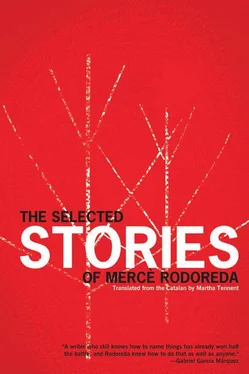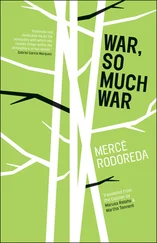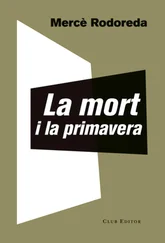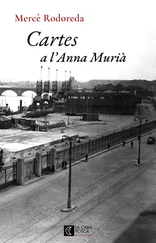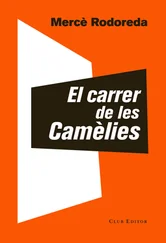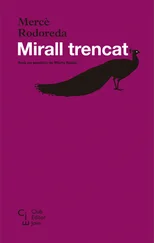Ah, gracious me, here we are; time just flew by. Well what I wanted to tell you is the world’s like a play, but the trouble is nobody knows how it ends, ’cause we all die before, and those that’s left just plug along as if nothing happened. Sometimes I get cranky, and I’m not one that ought to complain. I always been healthy, I’m not delicate-like. My stomach’s all swollen now, like I was pregnant, but I think it’s only holding water and it don’t bother me. When I think about all them that ain’t been so lucky like me, Mother of God, and all the tragedies they have, it’ll make you shudder. Well, I got to catch the tram to Bonanova, my Senyora lives on Avinguda de Craywinckel. Thank you, thank you, I’ll find it. All roads lead to Rome. Nice to meet you and Bona tarda.
Before I die I want to write an account of the last two years of my life to explain — explain to myself — everything I’ve been forced to renounce. One afternoon toward the end of winter, I was so cold that I went into a café and ordered a grog. The café was called “Els Ocells,” the birds. I sat down at a table by the window. People were hunched over as they hurried past. I was nervous. I’d had an argument with the instructor in my art course; he said my colors were too muted and I didn’t agree. I thought he was old fashioned and had terrible judgment. I found it utterly absurd that he didn’t want to understand me and realize that the way I painted was the way I had to paint. Besides, I was in a bad mood because I should have received a check from my uncle a couple of weeks before, and as I was leaving the pension in the morning, the proprietor asked me when I was going to pay my bill. To top it off, I had dropped my fountain pen on the floor and the tip had broken. I asked the boy in the café for pen and ink; I wanted to write my uncle at once. As I was taking paper and envelopes from my satchel, a man sat down beside me. There was nothing extraordinary about him. I would never have noticed him had he not sat beside me. Such audacity! I considered it offensive, especially as there were so many empty tables.
Among my classmates I was known to be rather wild and unsociable, a person “easily irritable, with unexpected, violent reactions.” The man sat there beside me without moving, his briefcase on the table casting a shadow on me. It was a good-quality briefcase, but worn, made of brown leather, with spots on it, a metal lock. He had provoked me, and without giving it a thought, I spilled my drink on him.
“Don’t worry.”
His voice made me even more indignant. A cold, dark voice, accompanied by an indifferent glance. He pulled out a handkerchief and calmly dried his trousers.
“I did it on purpose.”
“I don’t believe I have disturbed you.”
“Why did you sit at my table?”
“Forgive me, it is you who are sitting at my table.”
I looked at him in surprise.
“Tables in a café don’t have owners; they’re for the first person who arrives.”
“I am a creature of habit; I come to this café every day at the same hour, and invariably I sit at this table, summer and winter.”
•
The following day I returned to the café. He entered and headed straight to his table. I was sitting opposite. We looked at each other and laughed. The previous night, before falling asleep, I had thought about the incident with the drink and felt bad.
As I left the café I noticed he was following me. When I reached the door to the pension he addressed me:
“I would like to ask you something, something that is important to me: Please come to the café every day, if you can. I won’t address you, if you don’t wish me to. Your presence does me good. I entreat you.”
I began going to the café every day. We each sat at our own table, but we would leave together, and he would accompany me part of the way. One day he asked me, “Have you ever thought of getting married?” “No.” He said nothing more that day, but on the following he posed the same question, and I had one of my reactions. “I’m not going to respond. Come take a look at my room.” It was the perfect day to prove my point: everything was in disarray, a dreadful disorder. “You see? Do you believe a girl like me can consider getting married? And I smoke. I smoke like a madman who’s a mad smoker. Look at this.” I opened the wardrobe. None of my clothes were folded, everything was all jumbled up, towels mixed in with stockings, face creams, books with bars of soap, tubes of paint. “In a marriage, everything is order and harmony and I—”
“Have you ever been in love?”
“Never.”
“Don’t you love anything?”
“No.”
“Flowers?”
“No.”
“Music?”
“No.”
“Art!”
“No.”
“Animals?”
“No.”
“But, doves you do.”
“Roasted.”
He laughed and left. I accompanied him down the stairs.
The following day at three o’clock a boy arrived at the pension with two white doves in a cage. “For Senyoreta Marta Coll from Senyor Mârius Roig.” The following day I invited him to dinner: hors d’oeuvres, roasted dove, fruit and cheese for dessert.
“I thought as much.”
“What?”
“That they would be good.”
More than spilling the drink on his trousers, I regretted my crime. We went out for a stroll. As we walked I confessed that I had made the cook at the pension kill the doves. “I’m sure you thought I wouldn’t be capable of doing it.”
•
I didn’t go to the café the following day. I was filled with a strange sense of remorse. I couldn’t sleep that night. I kept thinking that he must have waited for me all afternoon. In the morning, I found a letter beside my café amb llet . “Please forgive my absence yesterday afternoon. It was impossible for me to come. You cannot imagine how I agonized.”
We met that day and were happy to see each other. We had a pleasant time, but I had a terrible dream that night. I was traveling, and everywhere I went — on trains, in hotels, in every country I visited — I encountered two white doves, the feathers on their necks soaked in blood. The afternoon that neither of us had gone to the café changed us. We were different. Closer. As if the day we hadn’t met had brought us together.
“Would you mind marrying a miserable man?”
“Why do you ask such strange questions?”
“Would you answer my question?”
“I can only give you one answer: I don’t know. I’ve never given it a thought. I suppose the only thing I’d ask of a man was that he love me.”
“I love you.”
•
From my diary:
I felt suffused by an infinite emptiness on the afternoon I didn’t go to the café. Terrible. I’ve learned something about myself. I don’t believe in anything. But I think the least one can ask of intelligent people is that they know how to be happy, how to live, how to accept. When we separated, he said, “Thank you.” “Thank you for what?” I asked. “For the trust you have shown me since we met.” He kissed my hand. As he walked away I stood in the center of the sidewalk, looking at him. I followed his shadow, the shadow of the briefcase attached to his body.
•
I moved. I rented a room with a little kitchen in a hotel. Occasionally he would stay for dinner, and then we would go to the cinema. Three months passed.
One day he asked, “Would you like to come to my house?”
“Why?”
“Have you ever realized that when I ask you a question, instead of answering you always say, ‘Why?’ I need you to come. Would you like to come to my house?”
We took a cab. He held my hand the whole time. The house was in the center of town, but in a quiet area. It had a tiny garden in front with two acacia trees and looked quite bourgeois: two stories, with small, silver-colored iron balconies.
Читать дальше
